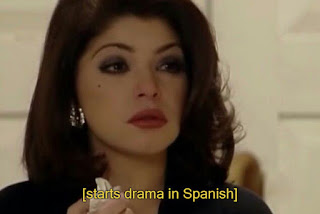¡Hola a todos!
I am really excited to be a part of this class as I love watching telenovelas. As Dr. Acosta-Alzuru said telenovelas are something we start watching since we are little. According to my mom, the first telenovela I saw was called Carita de Angel. It was for children and it was about a boarding school, to be honest, I don't remember much about it, I was around 3 years old. Ever since then, I kept watching telenovelas. The first telenovela I actually remember and still LOVE is Floricienta. It is an Argentinian children/teens telenovela and it is like the Latin American version of 'The Nanny'. The music is so good, that even nowadays I still play the music while I shower (and sing it to the top of my lungs).
"Que vendria a buscarla con sus flores amarillasss"
They even went on tour and she was the first concert I ever went to. The second telenovela I remember is called Patito Feo. It was an Argentinian children/teens telenovela and it was a high school version of 'Betty la fea'. It had a lot of drama, bullying, love, and amazing music. I remember that when Disney (yeah, they showed telenovelas in the Latin Disney) started advertising for this show I cried and begged my mom, like this:
So she would let me stay awake until 10 p.m because my bedtime was at 9:30 p.m and the show was from 9 p.m to 10 p.m, after Hannah Montana, which I also watched (primetime). I got away with it.
Nowadays, every time I meet a Hispanic friend I ask them if they watched telenovelas when they were little. First, I ask them for Floricienta, the majority says that they didn't watch it. Then I ask them if they watched Patito Feo, some say yes, some say no, but I still do the 'Las Divinas' dance.
"Nadie pasa de esta esquina, aqui mandan las divinas, porque somos gasolina, gasolina de verdad"
The last telenovela I ask them about is 'Rebelde' and EVERYONE has watched Rebelde. Rebelde is THE teens telenovela. I watched it when I was like 6 because my sister was 15 and I snuck into her room to watch a telenovela that probably wasn't appropriate for a 6-year-old but who cares. Rebelde is THE show of my childhood and my sister's teenage years. I am pretty sure many other teens in Latin America agree. It also has AMAZING music that I still sing to the top of my lungs, sometimes with my Mexican friends. We played it so many times last semester.
"Y soy rebelde, cuando no sigo a los demas y soy rebelde"
They also had a tour and I also went when I was like 8 and my sister was 17. I hold this show in my heart, and I have watched it many times more since they put it on Netflix. Sooo imagine my heartbreak when Dr. Acosta-Alzuru told us that this show is a REMAKE of an Argentinian teens telenovela called Rebelde Way. I was looking at the telenovela intro like this:
Pitifully it was not the only heartbreak I've had recently. A month ago I found that while they were filming Patito Feo, something terrible happened. The actress that was the best friend of the main character was raped by the actor that was the father of the main character. She was 16 and he was an older man. It is sad to know that while acting such a cheerful and nice person she was suffering so much, cause pitifully it happened many times. Sorry that this blog post had a sad ending.
Fun fact: She is the same actress from the first gif, she acted in OITNB too
Love & Light,
Nicole Andreina García Sanchez
















